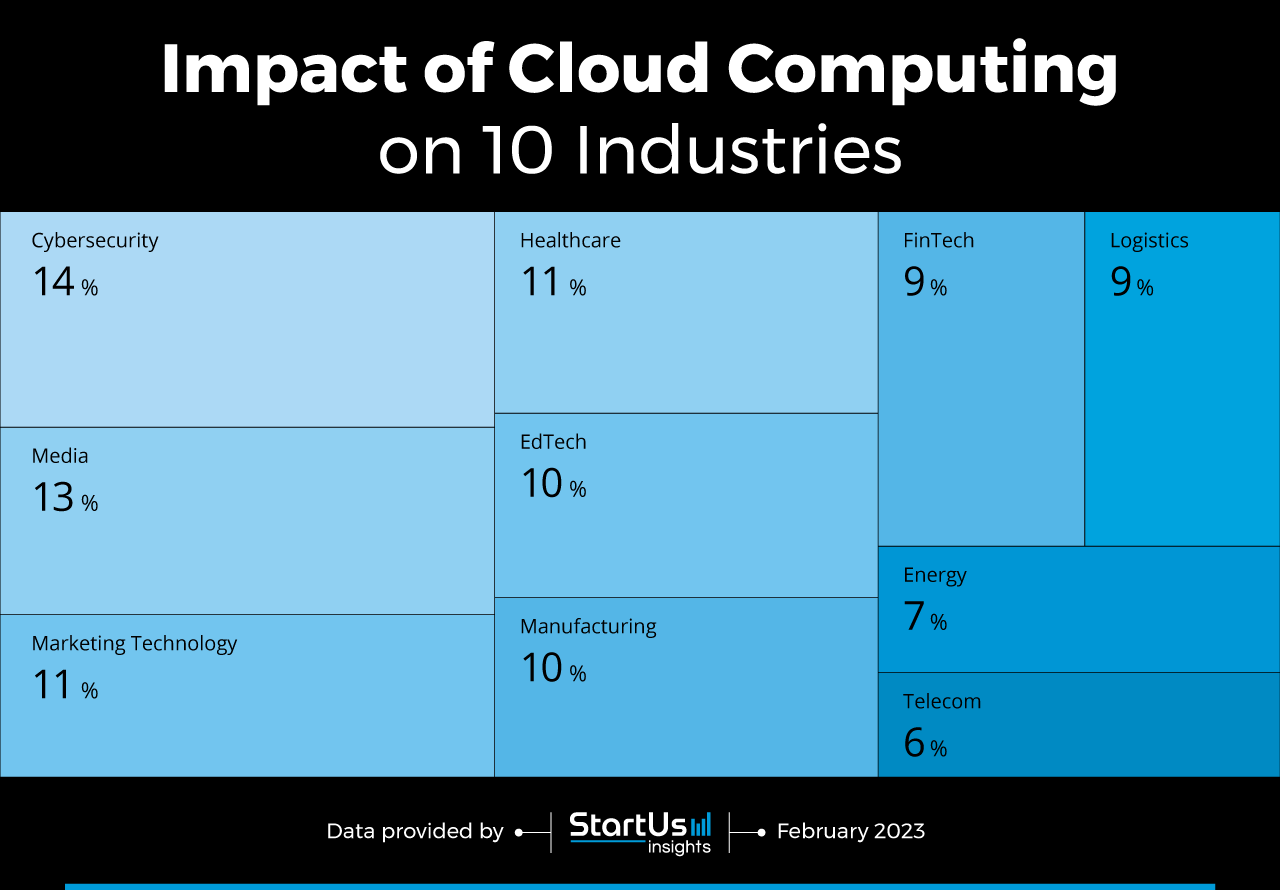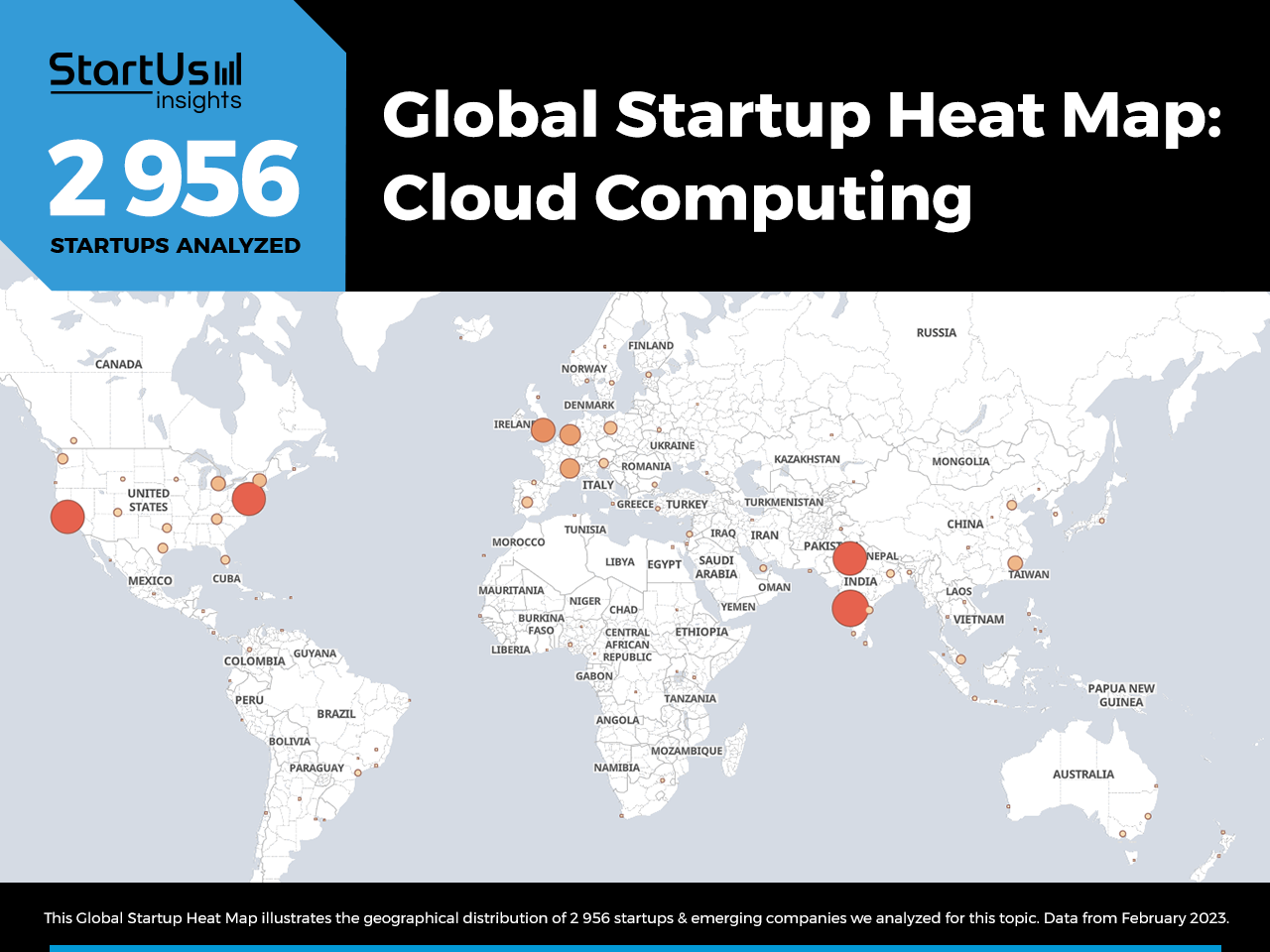Massive efforts in digitizing operations force businesses to maintain a complex IT infrastructure, which is expensive. On the other hand, the application of cloud computing enables a low-cost, simple, and more efficient means to manage business infrastructure and data. For example, cloud-based data analytics solutions eliminate the need for capital-intensive on-premise data processing systems.
We give you data-driven innovation insights based on our analysis of 2956 cloud computing startups & technologies so that you do not miss out on emerging solutions to improve operational efficiency. Read more to explore the impact of the examples of cloud computing on 10 industries and learn how they impact your business.
Tree Map reveals the Impact of Application of Cloud Computing on 10 Industries
The Tree Map below illustrates the impact of cloud computing applications on 10 industries. The cybersecurity sector sees the most activity among cloud computing startups as their solutions improve access to cyber risk management. Media, marketing, and FinTech companies use cloud computing to better utilize customer data.
Further, cloud-based solutions allow the healthcare industry to optimize operations and improve patient data management. Cloud computing also increases visibility into operations across manufacturing, logistics, and energy industries, to name a few. Lastly, cloud solutions enable telecom companies to enhance service delivery.
Global Startup Heat Map covers 2956 Startups & Scaleups
The Global Startup Heat Map below highlights the global distribution of the 2900+ exemplary startups & scaleups that we analyzed for this research. Created through the StartUs Insights Discovery Platform that covers 3 790 000+ startups & scaleups globally, the Heat Map reveals that India has a high concentration of cloud computing startups, followed by the US.
Below, you get to meet 10 out of these 2956 promising startups & scaleups as well as the solutions they develop. These cloud computing startups are hand-picked based on criteria such as founding year, location, funding raised, and more. Depending on your specific needs, your top picks might look entirely different.
Impact of Cloud Computing Applications on 10 Industries
1. Cybersecurity
Cloud computing improves the accessibility of cybersecurity solutions for small businesses and end users. Besides, integrating cloud platforms allows IT-admin teams to divert focus from diverse assets and centralize device and network management. That is why startups create cybersecurity-as-a-service (CSaaS) solutions. They enable small and medium businesses (SMBs) to avoid capital-intensive in-house team development and make network monitoring more flexible and affordable. This, in turn, improves risk assessments and vulnerability management.
SpecterX offers Cloud Data Security
Israeli startup SpecterX makes SpecterXGravity, an end-to-end data management platform for cloud-driven enterprises. It provides complete control over the data transfer to prevent data leaks and block incoming threats. The platform continuously manages and controls downstream data, thus protecting data channels with customers, suppliers, partners, and third parties. It offers complete visibility and extensive protection over the entire organizational data for cloud-driven enterprises, securing supply chains.
2. Media
Transitioning to cloud-driven workflows enhances operations in the media industry especially due to massive digitization efforts. Cloud computing improves data management, fan engagement, and content delivery across channels. This, in turn, allows media companies to accelerate digital content delivery and drive customer engagement. Startups create analytics-backed cloud computing platforms that further enable companies to leverage the massive digital touchpoints created by customers. This provides insights into customer preferences and social media trends, allowing media companies to streamline content.
ClouPlay improves Media Experience Management
Turkish startup ClouPlay provides media experience management. The startup’s cloud-based platform, Cloud Encode, manages, distributes, and broadcasts live media on the channels. It increases the speed and efficiency of media encoding servers. The startup’s other product, Digital OTT, collects real-time data from different channels, which enables broadcasters to make better decisions. It also assists media agencies and content creators in organizing media content, encoding live videos at higher speeds, and facilitating post-production collaboration.
3. Marketing Technology
Cloud computing makes customer data management more easier and affordable. Consequently, marketing companies utilize it to improve their advertising efforts and increase conversion rates. Additionally, brands centralize and automate their marketing operations with cloud computing. This increases visibility into ad performances and enables personalized marketing, accelerating brand growth and engagement. Cloud-based marketing platforms also allow companies to drive inbound sales through social engagement.
Glotelligence facilitates Marketing Automation
Glotelligence is a UK-based startup that makes Optimiser, a marketing automation platform. It combines sales and marketing data, customer relationship management (CRM), cloud computing, and AI. The platform optimizes customer life cycles, personalizes communication, and offers data-driven insights into marketing efforts. Consequently, businesses are able to unify sales and marketing channels, save resources, organize customer segments, and drive brand growth.
4. Healthcare
The healthcare sector generates massive amounts of patient and operational data through electronic health records (EHRs) and asset monitoring. Cloud-based solutions centralize these databases to improve visibility into operations and optimize healthcare management. As a result, they are able to ensure maximum resource utilization and efficient patient care. Cloud-based workflows also automate various backend operations like schedule management. This allows healthcare professionals to spend more time with patients and ensure prompt patient care. Centralizing data management further enables hospitals to mitigate data silos and improve collaboration between healthcare professionals.
Cohere Health provides Personalized Patient Care
Cohere Health is a US-based scaleup that develops a cloud-based healthcare platform. It offers personalized healthcare by understanding patient history and creating evidence-based care paths. Cohere leverages interoperability and data analytics to create care journeys and improve collaboration between healthcare providers, health plans, and patients. The platform also automates prior authorization processes during treatments to make them more efficient and reduce unnecessary costs. By automating administrative tasks, the startup’s solutions allow medical professionals to focus on patient care.
5. EdTech
The edtech industry is using cloud-based solutions to improve access to learning. Cloud computing enables educational institutions to push out and manage curricula more efficiently as well as improve operations. For example, cloud-based workflows automate operations like attendance tracking and class scheduling. Additionally, cloud computing enables schools and colleges to avoid high-maintenance and high-cost infrastructure for integrating eLearning systems. That is how SMBs in the education sector also deliver their services.
EduSys aids School Management
Indian startup EduSys creates a cloud-based school management platform. It is an enterprise resource planning (ERP) software tool that combines student information systems, classroom management, communication channels, and franchise management. The platform automates the student lifecycle, improves visibility into learning efforts, engages students and parents, as well as tracks attendance, among others. These features enable schools to reduce operational costs, improve brand management, and automate various school activities.

6. Manufacturing
The manufacturing sector is integrating digital-first technologies like the Internet of Things (IoT) and digital twins, making data management tedious. Cloud-based production management tackles this by centralizing data flow and mitigating data silos. It also improves visibility into factory operations and enables manufacturers to identify inefficiencies. Further, integrating AI or machine learning to analyze this data allows operators to identify optimization opportunities and increase plant performance. Cloud computing also enables manufacturers to scale operations faster and more efficiently.
FusePLM simplifies Product Lifecycle Management
US-based startup FusePLM provides a cloud-based platform for product lifecycle management. It allows floor operators to manage product issues, revise processes and parts, and regularly update documents and bills of materials (BOM). This ensures that the correct information is available to every employee. The startup’s platform uses a card-based workflow that simplifies change management and visualizes the impact of change, reducing the time to close change orders. The platform also allows BOM comparison against inventory levels to display shortages, improving purchasing decisions.
7. FinTech
Cloud computing, along with AI and ML improves financial data analysis and optimizes backend operations such as invoice, payment, crypto, and customer management. Startups leverage cloud computing to offer banking as a service. It also enables FinTechs to easily partner with banks and utilize customer data for product development and personalized marketing. Since data governance is an important aspect of financial data management, cloud-based workflows enable fintechs to quickly enforce policies, improving data security.
OuroX facilitates Digital Asset Exchange
OuroX is a US-based startup that advances financial inclusion and economic growth using AI, blockchain, machine learning, and cloud computing. The startup develops a digital asset exchange platform that offers crypto-to-crypto, crypto-to-fiat, and fiat-to-crypto exchange services. Additionally, its mobile-based cryptocurrency payment wallet allows users to store, send, and receive cryptocurrency. Moreover, it facilitates cross-border remittances at lower charges.
8. Logistics
Cloud logistics automate the supply chain and improves visibility into operations. Moreover, centralized cloud deployments allow logistics companies to mitigate data silos and bottlenecks. Startups make cloud-based solutions that offer real-time pricing and inventory details as well as improve asset utilization. They also simplify data transfer and compliance across suppliers, ensuring data security. Since digital workflows are critical in logistics operations, cloud services allow businesses to mitigate IT infrastructure maintenance while enhancing infrastructure scalability.
Everstox offers Logistics as a Service
German startup Everstox offers logistics as a service that facilitates fast distribution logistics. The startup’s cloud-based solution enables users to forecast demand and plan stock flows in real time. It provides data-driven fulfillment for eCommerce, business-to-business (B2B), and retail companies by matching the users’ fulfillment need with third-party logistics providers. The solution’s dashboard offers further visibility into logistic operations. These features enable logistics companies to increase delivery speed and reduce transport emissions in the supply chain.
9. Energy
The energy industry leverages cloud computing across the value chain to improve data availability and infrastructure flexibility. Renewable energy companies utilize cloud-based solutions to manage their multi-site assets, while utilities use them to streamline power sourcing. Moreover, startups offer cloud-driven data processing that allows energy companies to generate real-time insights into operations and eliminate inefficiencies. For example, an AI-powered load analysis platform enables better consumption analysis and load forecasting.
Tomsawyer aids Energy Assessments
Tomsawyer is an Indian startup that enables solar operators to perform energy and uncertainty assessments, as well as layout optimization. The startup deploys distributed energy assets, powered by a cloud-based platform, TS-X, and high-resolution data. This platform offers decentralized renewable energy monitoring and optimization using granular simulations, under-performance investigation, and yield reconciliations. It also enables solar energy producers to optimize designs and assess plant performance in real-time.
10. Telecom
Cloud computing allows telecom services to scale their services quickly. The technology also simplifies content delivery through centralized architecture. For telecom operators, cloud-based content management significantly improves operational efficiency and provides improved means to personalize content. Further, cloud computing eliminates the need for capital-intensive and complex IT infrastructure otherwise required in telecom for service delivery. Moreover, cloud computing enables a single point of control to ensure network security and automate network orchestration.
Smartcom offers Business-Critical Communication
Australian startup Smartcom provides business-critical telecommunications and cloud services. These include secure, high-quality voice and data services through point-to-point broad fiber links, national broadband network (NBN), asymmetric digital subscriber line (ADSL), and ethernet over copper (EOC). Besides, the startup provides infrastructure as a service (IaaS) which allows businesses to scale their operations more efficiently. This enables companies to promote agile workforces as well as improve the efficiency of employees working from home.
Discover All Cloud Computing Startups
Advances in data management and high-performing computing technologies will improve the efficiency of cloud deployments. Cloud security solutions are also impacting businesses as malicious attacks against cloud deployments are increasing. Additionally, startups are offering cloud management platforms that allow companies to streamline multi-cloud environments. These solutions will allow businesses to avoid network downtimes and improve data accessibility. Get in touch to identify specific cloud computing startups & solutions that advance your business!










